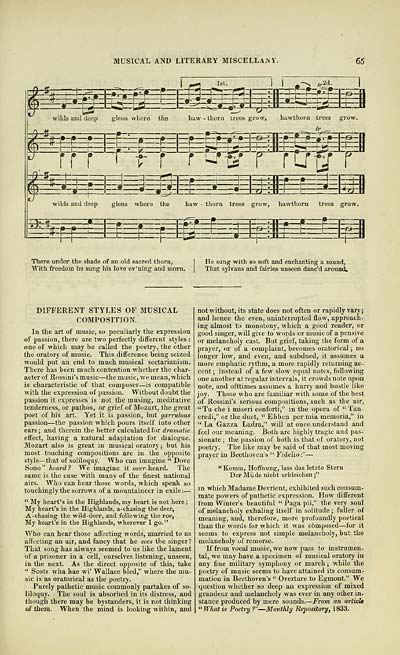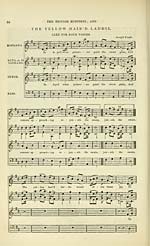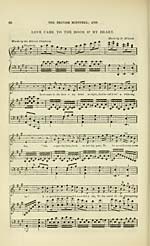Glen Collection of printed music > Printed music > British minstrel, and musical and literary miscellany
(403) Page 65
Download files
Complete book:
Individual page:
Thumbnail gallery: Grid view | List view

MUSICAL AND LITERARY MISCELLAJNY.
65
-If — t—j-i^-w—\-, — *-!-■-( 1 i— a|i-«— i — I — I — I \-~ i
-^-•-;
aiiHi
a:
B
-y^-
wilds and deep glens where the
haw - thorn trees grow, hawthorn trees grow.
i#-p=p=fi
:tzc:==:t:— i— i
:f=rp:
:^p=iEtp:
-©•
1
:|!te-P=
rr r -^ r r r ^^-& nr
->zr|»-'-F-'
1^
^^-^--
iUggliiiisi^ii
SI
— ■«— I —
wilds and deep
glens where the haw - thorn trees grow, hawthorn trees grow.
#=P=P=
-h-|-
--I—
^=P:
-©-
-'-I—'
i
There under the shade of an old sacred thorn.
With freedom he sung his love ev'ning and morn.
He sung with so soft and enchanting a sound.
That sylrans and fairies unseen danc'd arouud>
DIFFERENT STYLES OF MUSICAL
COMPOSITION.
In the art of music, so peculiarly the expression
of passion, there are two perfectly different styles :
one of which may be called the poetry, the other
the oratory of music. This difference being seized
would put an end to much musical sectarianism.
There has been much contention whether the char-
acter of Rossini's music — the music, we mean, which
is characteristic of that composer — is compatible
with the expression of passion. Without doubt the
passion it expresses is not the musing, meditative
tenderness, or pathos, or grief of Mozart, the great
poet of his art. Yet it is passion, but garrulous
passion — the passion which pours itself into other
ears ; and therein the better calculated for dramatic
effect, having a natural adaptation for dialogue.
Mozart also is great in musical oratory ; but his
most touching compositions are in the opposite
style— that of soliloquy. Who can imagine " Dove
Sono" heard? We imagine it owj-heard. The
same is the case with many of the finest national
airs. Who can hear those words, which speak so
touchingly the sorrows of a mountaineer in exile: —
" My heart's in the Highlands, my heart is not here ;
My heart's in the Highlands, a-chasing the deer,
A-chasing the wild-deer, and following the roe,
My heart's in the Highlands, wherever I go."
Who can hear those affecting words, married to as
affecting an air, and fancy that he sees the singer?
That song has always seemed to us like the lament
of a prisoner in a cell, ourselves listening, unseen,
in the next. As the direct opposite of this, take
" Scots wha hae wi' Wallace bled," where the mu-
sic is as oratorical as the poetry.
Purely pathetic music commonly partakes of so-
liloquy. The soul is absorbed in its distress, and
though there may be bystanders, it is not thinking
of them. When the mind is looking within, and
not without, its state does not often or rapidly vary;
and hence the even, uninterrupted flow, approach-
ing almost to monotony, which a good reader, or
good singer, will give to words or music of a pensive
or melancholy cast. But grief, taking the form of a
prayer, or of a complaint, becomes oratorical ; no
longer low, and even, and subdued, it assumes a
more emphatic rythm, a more rapidly returning ac-
cent ; instead of a few slow equal notes, following
one another at regular intervals, it crowds note upon
note, and ofttimes assumes a hurry and bustle like
joy. Those who are familiar with some of the best
of Rossini's serious compositions, such as the air,
"Tu che i miseri conforti," in the opera of "Tan-
credi," or the duet, " Ebben per mia memoria," in
" La Gazza Lartra," will at once understand and
feel our meaning. Both are highly tragic and pas-
sionate ; the passion of both is that of oratory, nut
poetry. The like may be said of that most moving
prayer in Beethoven's " Fidelio:" —
" Komm, Hoffnung, lass das letzte Stern
Der Miide niclit erbleichen ;"
in which Madame Devrient, exhibited such consum-
mate powers of pathetic expression. How different
from Winter's beautiful " Paga pii," the very soul
of melancholy exhaling itself in solitude ; fuller of
meaning, and, therefore, more profoundly poetical
than the words for which it was composed — for it
seems to express not simple melancholy, but the
melancholy of remorse.
If from vocal music, we now pass to instrumen-
tal, we may have a specimen of musical oratory in
any fine military symphony or march ; while the
poetry of music seems to have attained its consum-
mation in Beethoven's " Overture to Egmont." We
question whether so deep an expression of mixed
grandeur and melancholy was ever in any other in-
stance produced by mere sounds. — From an arficlt
" Wliat is Poetry T— Monthly Repository, 1833.
65
-If — t—j-i^-w—\-, — *-!-■-( 1 i— a|i-«— i — I — I — I \-~ i
-^-•-;
aiiHi
a:
B
-y^-
wilds and deep glens where the
haw - thorn trees grow, hawthorn trees grow.
i#-p=p=fi
:tzc:==:t:— i— i
:f=rp:
:^p=iEtp:
-©•
1
:|!te-P=
rr r -^ r r r ^^-& nr
->zr|»-'-F-'
1^
^^-^--
iUggliiiisi^ii
SI
— ■«— I —
wilds and deep
glens where the haw - thorn trees grow, hawthorn trees grow.
#=P=P=
-h-|-
--I—
^=P:
-©-
-'-I—'
i
There under the shade of an old sacred thorn.
With freedom he sung his love ev'ning and morn.
He sung with so soft and enchanting a sound.
That sylrans and fairies unseen danc'd arouud>
DIFFERENT STYLES OF MUSICAL
COMPOSITION.
In the art of music, so peculiarly the expression
of passion, there are two perfectly different styles :
one of which may be called the poetry, the other
the oratory of music. This difference being seized
would put an end to much musical sectarianism.
There has been much contention whether the char-
acter of Rossini's music — the music, we mean, which
is characteristic of that composer — is compatible
with the expression of passion. Without doubt the
passion it expresses is not the musing, meditative
tenderness, or pathos, or grief of Mozart, the great
poet of his art. Yet it is passion, but garrulous
passion — the passion which pours itself into other
ears ; and therein the better calculated for dramatic
effect, having a natural adaptation for dialogue.
Mozart also is great in musical oratory ; but his
most touching compositions are in the opposite
style— that of soliloquy. Who can imagine " Dove
Sono" heard? We imagine it owj-heard. The
same is the case with many of the finest national
airs. Who can hear those words, which speak so
touchingly the sorrows of a mountaineer in exile: —
" My heart's in the Highlands, my heart is not here ;
My heart's in the Highlands, a-chasing the deer,
A-chasing the wild-deer, and following the roe,
My heart's in the Highlands, wherever I go."
Who can hear those affecting words, married to as
affecting an air, and fancy that he sees the singer?
That song has always seemed to us like the lament
of a prisoner in a cell, ourselves listening, unseen,
in the next. As the direct opposite of this, take
" Scots wha hae wi' Wallace bled," where the mu-
sic is as oratorical as the poetry.
Purely pathetic music commonly partakes of so-
liloquy. The soul is absorbed in its distress, and
though there may be bystanders, it is not thinking
of them. When the mind is looking within, and
not without, its state does not often or rapidly vary;
and hence the even, uninterrupted flow, approach-
ing almost to monotony, which a good reader, or
good singer, will give to words or music of a pensive
or melancholy cast. But grief, taking the form of a
prayer, or of a complaint, becomes oratorical ; no
longer low, and even, and subdued, it assumes a
more emphatic rythm, a more rapidly returning ac-
cent ; instead of a few slow equal notes, following
one another at regular intervals, it crowds note upon
note, and ofttimes assumes a hurry and bustle like
joy. Those who are familiar with some of the best
of Rossini's serious compositions, such as the air,
"Tu che i miseri conforti," in the opera of "Tan-
credi," or the duet, " Ebben per mia memoria," in
" La Gazza Lartra," will at once understand and
feel our meaning. Both are highly tragic and pas-
sionate ; the passion of both is that of oratory, nut
poetry. The like may be said of that most moving
prayer in Beethoven's " Fidelio:" —
" Komm, Hoffnung, lass das letzte Stern
Der Miide niclit erbleichen ;"
in which Madame Devrient, exhibited such consum-
mate powers of pathetic expression. How different
from Winter's beautiful " Paga pii," the very soul
of melancholy exhaling itself in solitude ; fuller of
meaning, and, therefore, more profoundly poetical
than the words for which it was composed — for it
seems to express not simple melancholy, but the
melancholy of remorse.
If from vocal music, we now pass to instrumen-
tal, we may have a specimen of musical oratory in
any fine military symphony or march ; while the
poetry of music seems to have attained its consum-
mation in Beethoven's " Overture to Egmont." We
question whether so deep an expression of mixed
grandeur and melancholy was ever in any other in-
stance produced by mere sounds. — From an arficlt
" Wliat is Poetry T— Monthly Repository, 1833.
Set display mode to: Large image | Transcription
Images and transcriptions on this page, including medium image downloads, may be used under the Creative Commons Attribution 4.0 International Licence unless otherwise stated. ![]()
| Special collections of printed music > Glen Collection of printed music > Printed music > British minstrel, and musical and literary miscellany > (403) Page 65 |
|---|
| Permanent URL | https://digital.nls.uk/91439781 |
|---|
| Description | Scottish songs and music of the 18th and early 19th centuries, including music for the Highland bagpipe. These are selected items from the collection of John Glen (1833 to 1904). Also includes a few manuscripts, some treatises, and other books on the subject. |
|---|
| Description | The Glen Collection and the Inglis Collection represent mainly 18th and 19th century Scottish music, including Scottish songs. The collections of Berlioz and Verdi collected by bibliographer Cecil Hopkinson contain contemporary and later editions of the works of the two composers Berlioz and Verdi. |
|---|

